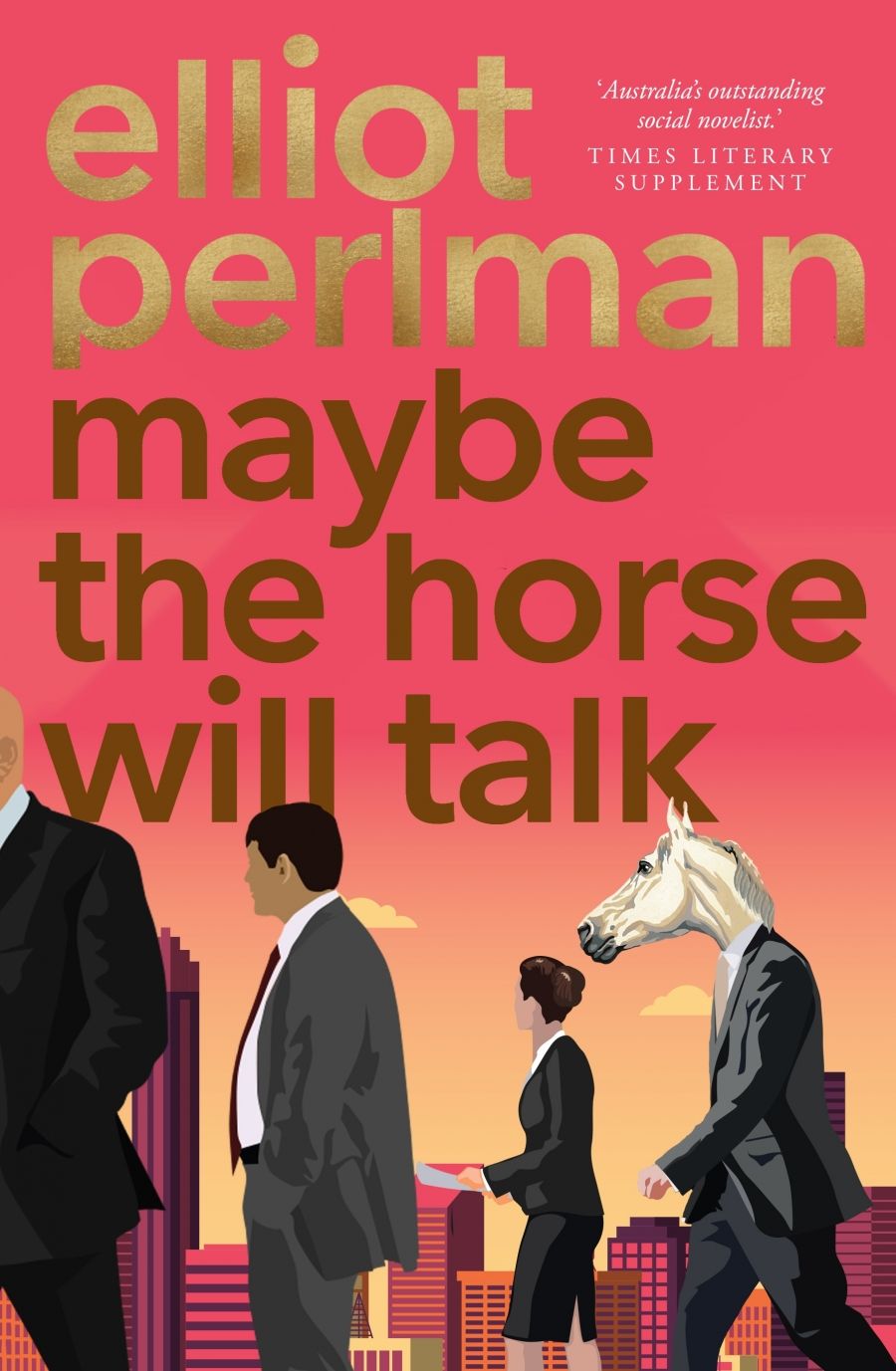
- Free Article: No
- Contents Category: Fiction
- Review Article: Yes
- Online Only: No
- Custom Highlight Text:
Elliot Perlman’s fourth novel is tentatively billed as a corporate satire and has a striking opening line: ‘I am absolutely terrified of losing a job I absolutely hate.’ The man in this all-too-familiar predicament is Stephen Maserov, a former English teacher turned lawyer. Maserov is a lowly second year in the Terry Gilliam-esque law firm Freely Savage Carter Blanche, which, apart from sounding like a character in a Tennessee Williams play, is home to loathsome dinosaurs in pinstripe suits and an HR department referred to as ‘The Stasi’.
- Featured Image (400px * 250px):

- Book 1 Title: Maybe the Horse Will Talk
- Book 1 Biblio: Vintage, $32.99 pb, 384pp, 9780143781493
The resulting story sets off so many alarm bells, it is hard to know where to begin. Let’s start with Jessica Annand, the head of HR at Torrent Industries, who falls in love with Maserov as soon as he opens his mouth. She is described thus: ‘Of Indian heritage, she was beautiful, frighteningly, with dark, soft eyes and the sort of bouncy black hair one only sees in advertisements for hair conditioners, lustrous yet manageable.’ Initially useless at her job and terrified of her own harasser, she soon gets a handle on this tricky human resources business once Maserov sets her straight. When they finally sleep together, Maserov admits that he has been thinking about her breasts since they met. One of Maserov’s colleagues, Fleur Ward-Gelding, is, ‘strikingly attractive with blue eyes and thick lustrous hair the colour of cruelty.’ The corporate world inhabited by Maserov is apparently akin to Themyscira. The physical attributes of the male characters are not remarked upon.
Maserov takes forever to get around to reading the affidavits of the four victims. When he does, three of them are immediately set aside and not mentioned again until the closing chapters of the book. We never meet these women or hear their voices. They are sidelined in favour of Maserov’s tone-deaf moral quest to help Carla Monterosso (‘dark, almond-shaped eyes framed by thick jet-black hair’), whose assault is described in graphic detail and should come with a trigger warning.
While reading Monterosso’s account, Maserov becomes so distressed that he shouts, ‘Get up!’ when she is pinned to the floor by the perpetrator. Upon completion, he says, ‘The paragraphs in Carla’s affidavit told a story, not of sex, but of humiliation and power, the arbitrary exercise of power in the expectation of almost complete impunity.’
This mansplaining, virtue-signalling, Op-Ed style sits very uneasily in the novel’s jaunty, comedic context. In addition, telling a victim what they should have done during a violent assault is unhelpful, dismissive, and evinces a startling lack of empathy. It also feeds directly into the white-knight syndrome that lies at the heart of the book.
Is there an appetite for male saviour #MeToo fiction? One might argue the importance of having men involved in the movement; that their presence enables other men to understand the error of their ways; that it is vital men be seen supporting women. The counter-argument is that men should shut up and listen for a change, stop trying to dominate the narrative, and ‘fix’ things. By blundering in where angels fear to tread, Perlman has placed himself in an awkward position. If Maybe the Horse Will Talk is indeed a satire, it is a clumsy one, poorly timed. If it is meant to be a clarion call for gallant men to come to the rescue of our sisters, why are women portrayed in such a cringeworthy fashion? Maserov is constantly praised by an array of beauties for being a good, decent man. In fact, that’s all the women talk about – men. Bechdel Test abject fail.
Issues multiply as the narrative skips blithely along. The characters are two-dimensional. No one has a backstory, not even Maserov. We are told he used to be a teacher, and that’s it. He goes from being a cowed underling to a stiff-backed alpha ready to bring down the system in a matter of pages. What is perhaps most distasteful is that Maserov’s cockamamie scheme to save the reputations of four wronged women (well, Monterosso and three also-rans) is conducted for personal gain. Maserov wants to impress the starry-eyed HR girl and win back his estranged wife by securing substantial payouts for the victims. Money is equated with justice. Monterosso’s trauma – never much evidenced in the first place – vanishes when she sees how many zeros are on the cheque.
Given the appalling way in which women’s complaints are often handled in the real world, Maybe the Horse Will Talk teeters on the precipice of being a disastrous idea for a novel. Perlman’s heart is presumably in the right place, but diving headlong into the complexity of sexual harassment brings with it a lot of responsibility. The pervasive idea of women here is as helpless subalterns who just need the assistance of a capable man to sort out their problems, preferably a handsome one who views them as delicate, pretty objects to be cherished and protected. It might be wise to keep peddling the satire line, because a bubbly, old-fashioned romantic comedy set against the backdrop of violent sexual assault risks drawing nothing but enmity from the very audience it purports to defend.



Comments powered by CComment